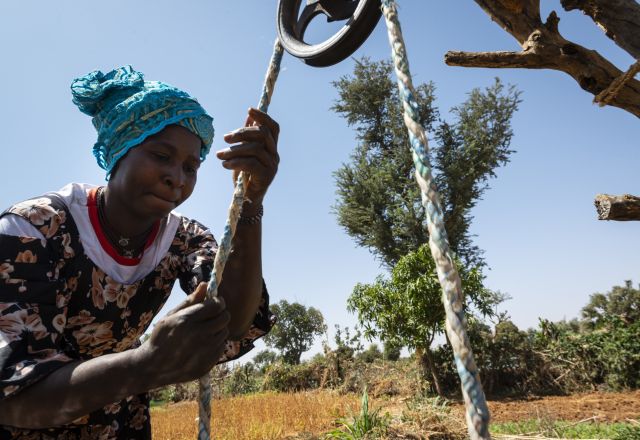
Less water means more hunger, more disease and more people forced to leave their homes
- 2 mins read time
- Published: 22nd March 2024
Wealth means water
Water is vital for our survival, but many people around the world don’t have access to clean water. The United Nations estimates that two billion people don’t have safe drinking water. It says that up to three billion people experience water shortages for at least one month each year.
Oxfam’s new analysis of 350 corporations using World Benchmarking Alliance data, comes ahead of World Water Day (22 March). These corporations make up over half of the world’s food and agriculture revenue.
This analysis gave many unsettling results when it comes to corporations.
- Only 28% of the world’s most influential food and agriculture corporations are reducing their water withdrawals. A water withdrawal is when freshwater is taken from a water source, either permanently or temporarily, for use.
- 23% are taking action to reduce water pollution.
- Just 108 of these 350 corporations are disclosing how much water they withdraw from water-stressed areas.
- 72% of all freshwater withdrawals are used for agriculture, which is the largest water-using sector worldwide, according to a recent research. Industrial farming plays a major role in water pollution.
“Thirst for profit,” a report from Oxfam France, also highlights “water grabbing” by large companies. This refers to companies taking control of water resources and using them for their benefit at the expense of others.
An example is bottled water. One million bottles are sold worldwide every minute. The bottled water industry is drawing on reserves and selling them for 150 to 1,000 times more than tap water.
Money and water are closely linked. Rich people have better access to safe public drinking water. They also have enough money to buy expensive private water. People living in poverty spend large amounts of their income on water. Rising global temperatures is making water even more scarce in many countries across East Africa and the Middle East. Oxfam warned last year that up to 90% of water boreholes in parts of Somalia, Northern Kenya and Southern Ethiopia had entirely dried up.
“When big corporations pollute or consume huge amounts of water, communities pay the price in empty wells, more costly water bills, and contaminated and undrinkable water sources”— Cécile
“We clearly can’t rely on corporations’ goodwill to change their practices —governments must force them to clean up their act and protect shared public goods over thirst for profit.”
Oxfam is calling on governments to do three things.
- Recognise water as a human right and a public good that is not driven by profit.
- Hold corporations accountable for abusing and violating human and environmental rights and laws, including water pollution.
- Invest in water security, provision, management and climate-resilient water, sanitation and hygiene (WASH) services.
